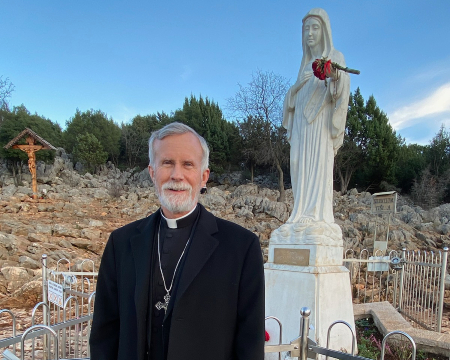Deal Hudson on Culture and the Death of God
FREE Catholic Classes
The desire for God is hardwired into our most basic desire, the desire to live, to love, to serve a purpose larger than ourselves. It's a desire that can never be extinguished, certainly not by the current academic ideology endured by the majority of college and university students, especially at the so-called "major" universities. The day will come, I predict, when the unspoiled vitality and questioning of our youth will finally dismantle and overcome the postmodern ideology of their professors. After all, the very professors proclaiming there is no truth and no God are human too and filled with longing for the very thing they deny.
 Hi readers, it seems you use Catholic Online a lot; that's great! It's a little awkward to ask, but we need your help. If you have already donated, we sincerely thank you. We're not salespeople, but we depend on donations averaging $14.76 and fewer than 1% of readers give. If you donate just $5.00, the price of your coffee, Catholic Online School could keep thriving. Thank you. Help Now >
Hi readers, it seems you use Catholic Online a lot; that's great! It's a little awkward to ask, but we need your help. If you have already donated, we sincerely thank you. We're not salespeople, but we depend on donations averaging $14.76 and fewer than 1% of readers give. If you donate just $5.00, the price of your coffee, Catholic Online School could keep thriving. Thank you. Help Now >
Highlights
Catholic Online (https://www.catholic.org)
3/5/2014 (1 decade ago)
Published in U.S.
Keywords: beauty, Liturgy, love, relationships, Terry Eagleton, Jesus, faith, Culture and the death of God, God is dead, priesthood, culture, enthsuiasm, renewal, reform, Catholic Culture, rubrics, worship, Holy Mass, Divine Liturgy, Pope Emeritus Benedict XVI, Deal W. Hudson
WASHINGTON,DC (Catholic Online) - I noticed recently that the distinguished British literary critic Terry Eagleton has published a book entitled Culture and the Death of God. The book will be available in the US in a few weeks, so I haven't read it, but I did see an interesting review in The Guardian. The reviewer was puzzled by Eagleton's basic thesis that despite Nietzsche's announcement of the death of God, and all the acolytes who have repeated it, God has survived.
The reviewer's surprise made me chuckle, because I am reminded of my years in the academy where so many well-educated and articulate people actually believed the culture was as secularized as they described it, and as they wished it to be. It's quite alarming how much of academic "analysis" is prescriptive rather than the dispassionate, descriptive account one should expect from a scholar. Or, should I say, used to expect. The academy, like the media who apes it, has been firmly in the hands of post-modernists who can't claim neutrality because they don't believe in objective knowledge of anything (except perhaps their political opinions)!
I don't mean this to be a wholesale rejection of ongoing scholarly work - there are many exceptions, such as the brilliant overview of American popular culture by LeRoy Ashby, With Amusement for All: A History of Popular Culture since 1830 (University of Kentucky Press, 2012). Ashby, in his book, has taught me more about the history of America than any three other books. Why? Because by tracing popular culture, Ashby creates a fascinating and insightful account of the needs, desires, and aspirations of common men and women, not those whose prognostications and proclamations bear little relationship to the majority of real people.
This brings us back to the topic of the death of God in contemporary culture. I've now lived 64 years, encompassing the several generations of significant change, including the TIME magazine cover proclaiming God's death on April 8, 1966 (I was a junior in high school). That was nearly 50 years ago. Since then there have been several transpositions of the same message under the guise of secularity, multiculturalism, and postmodernism. Tell that to the 74% of Americans who say they believe in God, the 72% who say they believe in miracles, and the 68% who believe Jesus is the Son of God.
Polls, however, are not as important as the evidence of history from the ancient past to the present - God has never been less than a central preoccupation of human consciousness, whether as an answer to the question, "Why do I exist?," or to the question most often asked, "What is the purpose of my life?" The artifacts of culture, whether books, music, TV, movies, plays, and the detritus of the Internet, provide evidence that God is as much a part of the human conversation as when He was addressed in the plural.
From the table of contents, I have gleaned that Terry Eagleton will describe how God survived successive generations of skepticism (the Enlightenment), self-preoccupation (the Romanticists), denial (the Existentialists), and avoidance (the Post-Modernists). To the extent that such leading ideas and the human ideals they propagate are explained, this puts Eagleton's feet on real ground. But it's precisely the fact that most people during the Enlightenment did NOT embrace skepticism, or become Romantic egoists, or deny God, or follow postmodernism in avoiding any consideration of ultimates that explains a culture still asking the God question and, to a great extent, receiving an answer.
I don't know if Eagleton will address the most fundamental question of human nature. The desire for God is hardwired into our most basic desire, the desire to live, to love, to serve a purpose larger than ourselves. It's a desire that can never be extinguished, certainly not by the current academic ideology endured by the majority of college and university students, especially at the so-called "major" universities. The day will come, I predict, when the unspoiled vitality and questioning of our youth will finally dismantle and overcome the postmodern ideology of their professors. After all, the very professors proclaiming there is no truth and no God are human too and filled with longing for the very thing they deny.
© Deal W. Hudson, Ph.D
-----
Deal W. Hudson is president of the Morley Institute of Church and Culture, Senior Editor and Movie Critic at Catholic Online, and former publisher and editor of Crisis Magazine.This column and subsequent contributions are an excerpt from a forthcoming book. Dr. Hudson's new radio show, Church and Culture, is heard on the Ave Maria Radio Network.
---
'Help Give every Student and Teacher FREE resources for a world-class Moral Catholic Education'
Copyright 2021 - Distributed by Catholic Online








 Daily Readings for Sunday, April 21, 2024
Daily Readings for Sunday, April 21, 2024 St. Anselm: Saint of the Day for Sunday, April 21, 2024
St. Anselm: Saint of the Day for Sunday, April 21, 2024 A Prayer for the Dying and a Special Soul: Prayer of the Day for Sunday, April 21, 2024
A Prayer for the Dying and a Special Soul: Prayer of the Day for Sunday, April 21, 2024


